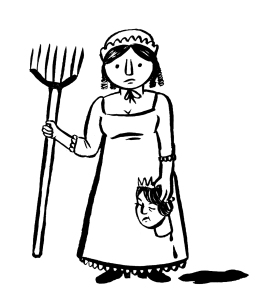If George R.R. Martin rewrote the classics of English literature a la Game of Thrones…

Illustration by Rebecca Schuchat
Pride and Prejudice
Elizabeth Bennett is engaged to Fitzwilliam Darcy, but Darcy’s aunt Lady Catherine de Bourgh disapproves and hires mercenaries from the Golden Company to slaughter the entire engagement party. Elizabeth’s friend Charlotte Lucas vows revenge, travels across the sea to apprentice with a cult of assassins, and decapitates Lady Catherine with a garden rake.
Mrs. Dalloway
Clarissa Dalloway is throwing a party, and her daughter’s tutor, a religious enthusiast, tells her the party will fail unless she sacrifices her daughter to the Lord of Light in a ritual bonfire. The daughter is burned at the stake in Regent’s Park but white walkers nonetheless descend upon the party, eat all the canapés, and then eat the guests. The party is not a success.
The Great Gatsby
Daisy and Gatsby, brother and sister, are happily committing incest when Daisy’s power-hungry father forces her to wed Tom. Tom is in love with Myrtle and launches an armed insurgency to defend Myrtle’s honor from Rhaegon, even though Myrtle is secretly married to Rhaegon. Myrtle and Rhaegon die but first have a secret son who ends up sleeping with Rhaegon’s baby sister. Yep, just another wild Roaring 20s party at West Egg.
Beloved
Sethe and her family are freed from slavery by Daenerys Stormborn, Mother of Dragons. But Sethe’s daughter Beloved is chopped into tiny bits by vengeful Sons of the Harpy and becomes a ghost. Sethe falls in love with Grey Worm, a eunuch who is the only other dark-skinned character in the entire universe. Together they feed the Sons of the Harpy to very large and hungry dogs.
On the Road
Sal Paradise and Dean Moriarty travel across the country for kicks. On the way, they each lose a leg, an eye, an arm, and their manly parts. They eat rats. They sleep in mud. They get buboes. When they finish their journey, Sal publishes a best-selling epic poem about it, “The ’47 Cadillac of Castermere.” Dean poisons him. He dies.
To Kill A Mockingbird
When white lawyer Atticus Finch defends a black man accused of rape, his daughter Scout is ostracized and attacked. Mysterious neighbor Boo Radley summons dragons to rescue her and they incinerate Maycomb, Alabama. Everyone dies.
Catcher in the Rye
Holden Caulfield is expelled from the Night’s Watch and wanders around north of the wall with his direwolf, expressing disgust with the hypocrisy of feudal society. His sister Phoebe follows a one-eyed raven to find him, but they are ambushed by white walkers. Everyone dies.

Illustration by Rebecca Schuchat
Of Mice and Men
Lenny pets the puppy. It’s actually a dragon. Everyone dies.
The Road
A father and son travel through a bleak post-apocalyptic landscape. Reaching the sea, they find a fleet of tall ships heading to Westeros. The father turns out to be an ace swordsman. The son discovers a hidden talent for baiting bears. They sail away, help Daenerys Stormborn win the throne, and marry princesses. Nobody dies.


